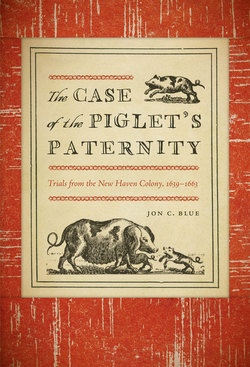Читать книгу The Case of the Piglet’s Paternity - Jon C. Blue - Страница 16
На сайте Литреса книга снята с продажи.
Оглавление7
THE WOMEN DISSIDENTS
The 1646 trial of three women for “several miscarriages of a public nature” reveals the Orwellian nature of life in the New Haven Colony.1 The community was centered on the church, and the word of the minister was law. Dissent was not permitted. Potential informants were everywhere. Any person so bold as to question the minister risked being brought before the General Court. This was the unhappy experience of Mrs. Brewster, Mrs. Moore, and Mrs. Leach.2
As readers of Victorian novels will recognize, servants could hear many things said in a house. Once a servant left her position, there was little to stop her from relating what she had heard. This was the case with Elizabeth Smith, “late servant to Mrs. Leach,” who informed the court what she had heard in her former service.
One day, Smith told the court, she heard Mrs. Brewster “loud in conference” with Mrs. Eaton,3 Mrs. Moore, and Mrs. Leach “as she sat at work in the next room.” Apparently finding the “conference” to be of interest, Smith called a fellow servant, Job Hall, to listen with her because he “could better remember the particulars of such a conference than herself.” Hall later joined Smith in testifying before the court.
The servants had a great deal to say. Their charges against Brewster alone are divided by the records into twelve different allegations, much like a modern-day bill of particulars (a legal list of charges). The court heard each of these charges, allowing Brewster to respond at each turn. None of these replies proved persuasive to the court. Here are the twelve charges made by Smith and Hall.
First, Brewster had discussed a sermon given by John Davenport, minister of the church. Although Hall—who had been recruited for his ostensibly superior memory—“was somewhat doubtful” as to who exactly said what, he implied that Brewster had criticized Davenport for saying that persons “could not have salvation without coming into the church.”
Brewster denied the charge. This, apparently, repeated an earlier denial that she had made to the governor and the magistrate.
Second, Brewster had disputed a comment that Davenport had made in a sermon on Ephesians 4:12.4 Davenport had said, “If a man lived where he might join the church and did not, it would prove a delusion to him.” Brewster stated that when she heard these words, “her stomach wombled as when she bred [a] child.” According to Smith, Brewster said she was “sermon sick” two or three times and, when she came home, told her son to “make waste paper” of her notes of Davenport’s sermon.
Brewster denied using these words but admitted saying that “her stomach wrought, smelling an ill savor in the seat.” Her explanation, we are told, “gave no satisfaction to the court.”
Third, Brewster asked Moore “whether she had not heard for what Mrs. Eaton was cast out of the church.”5 Moore asked Eaton why she did not confess her sin. Eaton replied that she had done so but not to the church’s satisfaction. Brewster said that “if Mrs. Eaton had seen her light before she came into the church, she had not come in.”
